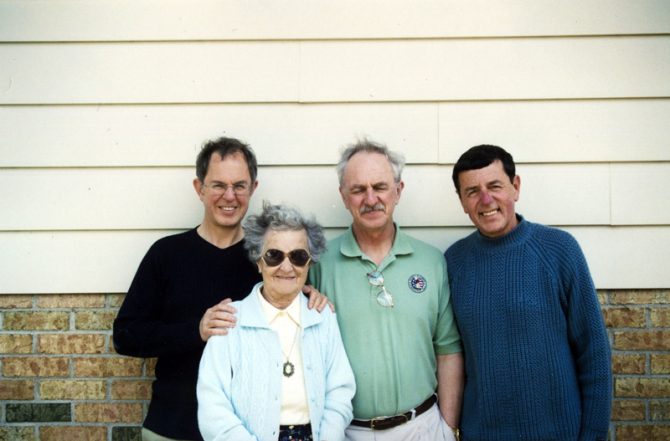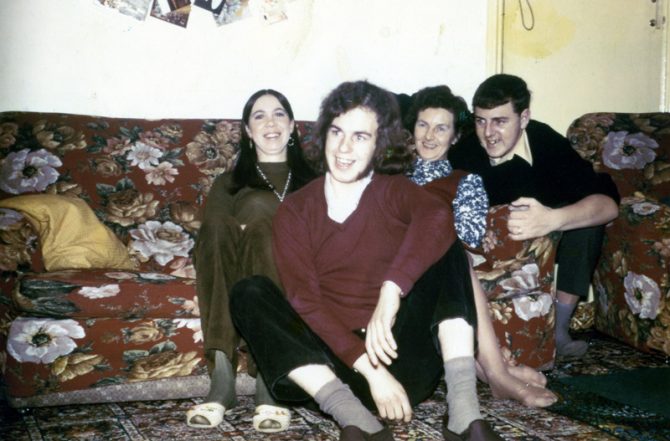JL Dutaut meets an influential academic trying to reconcile himself to the fractures in his life and society at large
Memoirs of educational academics are a pretty rare thing. If not altogether anonymous, bar the inevitable popularisers and marketeers, educational academics tend to remain in the background of their work. What do we know, really, of the life and times of John Dewey or Maria Montessori?
Yet a memoir is what Andy Hargreaves has just written, casting himself as the subject of his own reflection on education and social mobility. It’s a move that’s possibly creating a new genre of educational writing and a whole new form of accountability for a field that is often criticised for its distance from the real world. Think, for example, of the Gove/Cummings-inspired label of ‘the Blob’.
It’s ironic in a way. Hargreaves hails from Accrington, a town whose football club, Accrington Stanley, is famous for not being famous thanks to a milk advert which cast it as the ultimate non-entity. “Accrington Stanley? Who are they?” asks one boy. “Exactly,” answers his milk-drinking friend.
So, who is he? Well for starters, he’s a supporter of Burnley FC, considered by Accrington fans one of their chief rivals. He’s been listed among the top 10 influential education academics in the United States, is an honorary professor at the University of Swansea, a visiting professor at the University of Ottawa, a research professor at Boston College, a distinguished visiting professor at Hong Kong University and Professor II at the University of Stavanger in Norway. He recently assisted the Scottish administration in evaluating the Curriculum for Excellence – often derided here by ministers and policy influencers – and is currently conducting research on behalf of the ARC Education Project, an international consortium of education ministries and professional associations.
The author of 30 books and countless articles on educational practices, policies, structures and reforms, Hargreaves wrote his second, Curriculum Practice, five years before the creation of a national curriculum and 25 years before Ofsted took any interest in schools’ ‘intent, implementation and impact’.

Yet in England, where he started his career as a primary teacher in 1973, you would be forgiven for thinking he’s as anonymous as his home town’s football club. That’s despite carrying out work for the DfE, the SSAT and the National College for School Leadership on expectations, raising achievement and teacher effectiveness in the New Labour years. A testament, perhaps, to the sheer size of the pendulum swing in educational politics in the Westminster system.
But at the age of 12 in Accrington, his future career was an unlikely one. So has anything changed for that town’s children in the interim? And what does Hargreaves’ decision to quit the country for Canada tell us about the answer?
Born and raised “on the wrong side of the tracks” – “Although,” he adds with a northern lilt still evident in his speech, “in Accrington all sides of the tracks were the wrong side of the tracks” – he thrived at primary school. “I had teachers, particularly one teacher who really was everything Ken Robinson would have wanted.”
In Accrington all sides of the tracks were the wrong side of the tracks
The youngest of three brothers, he was the only one to pass the 11-plus and things started well at grammar school. “I had a good first year. I was in the top stream in the top school and in some ways I was the top kid, especially in maths and in Latin. I was eager. I was enthusiastic. And then me dad died.”
The Americanisation of his speech comes to the fore as he recounts the fallout. “It wasn’t so much its direct impact on me but more the impact on my mom.” She had a breakdown. His two older brothers were working in factories and keen to start adult lives of their own to take the pressure off her, but it left Hargreaves at home as a young carer – in 1964 a phrase many years from political invention. “Suddenly I found I didn’t get to school for months on end before 11 o’clock in the morning.”
Hargreaves spent his secondary school career trying to reconcile the school’s expectations with his reality and the “teams and captains and head boys” culture of grammar school with the working-class culture of his family, friends and neighbours. He was trying to live up to both.
Trying to live with two cultures was and is also true for white working-class kids
Seamlessly, he segues into analysing issues still impacting education in England today, and the contrast with Amanda Spielman’s comments about ‘lacking aspiration’ couldn’t be starker. “The head of Spring Hill primary school where I went sent a wonderful letter describing how that all plays out for Asian girls today, trying to live with two cultures and bring them together. It was and is also true for white working-class kids, and I think we have to not put these against each other but see them both as being equally important.”
Reconciling cultures emerges as a theme as we speak. There’s the reconciliation of linguistic influences in his speech patterns, the reconciliation of class and ethnic cultures, but also the reconciliation of primary and secondary schooling cultures or, as some might have it, of traditionalist and progressive approaches. “Everything that my primary school gave me, my secondary school didn’t apart from one notable exception, who was my geography teacher.”

Prominent in his career has also been an attempt to bring together practitioners and policy makers, and it seems, in his view, to have fallen on deaf ears in England. His comments are diplomatic, but they only thinly veil his critical view of the current UK government in that regard, not least in respect of their coronavirus response which is totemic of a system that does policy to schools, rather than with them. “If you’ve made a mistake, apologise fast and get on and try and learn from it. Do it together rather than dropping policy bombs from a great height.”
“Coronavirus is like working in a very difficult school on a national basis,” he adds. “In the best systems [among which he cites New Zealand, Scotland and Wales], teachers have been allowed to be the first responders. The worst systems have run off fear.”
He is scathing about “quasi-totalitarian leaders who are smug about their majorities, where the economy has more priority than the people, the stock market has more priority than jobs and election results have more priority than children.
“And you can decide who those countries are,” he adds.
It was the stifling of education research under Margaret Thatcher’s government that drove him to Canada in 1986. “It became impossible to do your job as a university professor with integrity.” After five years of working with Tim Brighouse in Oxford – “with local schools and local teachers, working on things of importance to them as equals” – it was time for a new chapter.
Coronavirus is like working in a very difficult school on a national basis
That year, he published Two cultures of schooling: The case of middle schools, following on from his PhD thesis on the same theme. Developed by Sir Alec Clegg (“probably the most innovative Director of Education in England, in the West Riding of Yorkshire”) when Hargreaves was still at primary, middle schools were a central policy recommendation of the 1967 Plowden report. Today, it is the only one of its recommendations that has not been adopted into legislation in one guise or another. Others included the banning of corporal punishment, state-funded nursery provision and the introduction of ESOL/EAL programmes.
Clegg “wanted to extend the primary school philosophy up to 12/13 years old.” Hargreaves’ research showed why the reality was difficult to achieve, but in the process he learned something else, which speaks to the current mantra of evidence-based practice. “I really began to understand teachers as a product of their environment, rather than just what’s the right and the wrong way or the best and the worst way to teach.”
His own abrupt transition to secondary and young adulthood may explain his deep desire for conciliation. In the end, Hargreaves made it through with the grades for university. But even his application offers a lesson that’s still relevant. “I thought I had nothing to put on my application because I wasn’t in any clubs. I didn’t have time to. But I had hiked the Pennine Way when I was 17, which I’d planned and executed.”

The fractures and disconnects Hargreaves experienced didn’t stop him from attaining a long and influential career advising governments and global organisations like the World Bank.
But the world is a different place. “The generation I grew up in, we had quite a lot [of social mobility] because there was lots of room at the top. It’s much harder for kids now. Internships, clubs, the more you rely on an expanded CV, the harder it is for kids from disadvantage to show what they can do.”
Sadly, for Hargreaves, England is not different enough.
It’s optimistic to think a memoir could contribute to the course correction he believes our society needs, but reconciling academia with its roots in the real world doesn’t seem a bad place to start.
And neither does Accrington, come to think of it. Though reconciling its fans with Burnley’s may be too big an ask for anyone.














Your thoughts